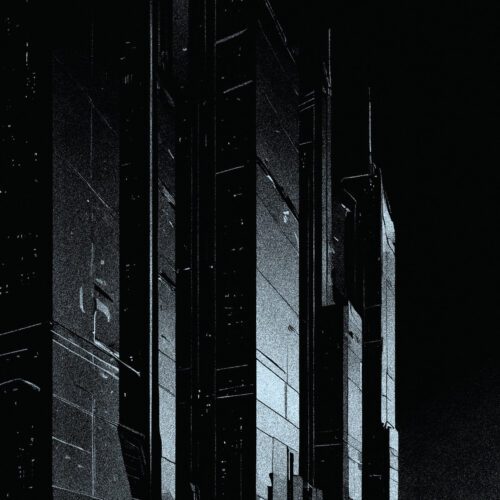The movie Robocop (Paul Verhoeven’s, in 1987, the original) is for me and many film fans an absolute masterpiece of ultra-violent, and above all deserved, social and political criticism of the Reaganian United States. The warning signs have apparently not been heeded, as the same country, under Trump, seems to be heading even more resolutely in the direction envisaged by the film. That said, the French trio Fragments, made up of Benjamin Le Baron (keyboards, machines), Tom Beaudouin (guitar, synths) and Antoine Gandon (drums, machines) have come up with the idea of reconstructing a whole new soundtrack and playing it on stage in front of the film projection. A ciné-concert reinvented, in other words.
Let’s be clear about this: nothing will replace the perfect symbiosis between the film and the original music written by Basil Poledouris, a jewel of an electro-symphonic mixture, even before it became fashionable. Poledouris’ themes, and above all his mastery of textural contrasts, which he optimises through the possibilities of symphonic ensemble and synthetic lutherie, paint an incomparable visual, emotional and psychological portrait of this award-winning cinematic work.
I haven’t seen the film-concert in question with this new music. I’d like to do so in order to reach a more informed opinion. But having seen the film several times, I can imagine this new embrace between the iconic images and the music offered here by Fragments, and I’m guessing a fine aesthetic achievement. Not least because the music itself is excellent. The very 80s synth ‘colour’ is uniformly applied, and seems to be a perfect conceptual match with the period visited by the script. Which can be a problem, but later on that. The rhythms and melodies form a catchy, sometimes haunting, narrative. A little something of Tron/Wendy Carlos comes through, and that’s not bad at all. In short, Delta City is an excellent purely musical composition, and probably a memorable marker in this renewed Robocop offering. I’m the first to applaud re-readings of existing works. Art is alive. To immobilise creations in a fixed posture by refusing or denigrating re-appropriations, as certain purists do, is to condemn these jewels to gathering dust.
Now that that’s out of the way, I’ll take the liberty of evaluating the two options, since they’re right in front of us. Robocop with the music of Poledouris or that of Fragments? I’m tempted to answer: why choose? The two complement each other and offer a different, enriching experience, each in its own way. But let’s say that, for the sake of argument, and reiterating that my assessment of Delta City remains fractional because I didn’t see the version with the film, I’m tempted to stick with the Poledouris score. And why is that? For the reasons given above and the much wider range of pictorial and psychological characterisations made possible by the instrumental means Poledouris had at his disposal. And above all because, at the time, the composer had no distanced observation of the dystopian world he was setting to music, and was therefore not subject to mnemonic and cultural clichés that emerged after the fact. What’s more, he worked with the director on a daily basis. We can assume a very intimate vision of the subject and the psyche invented in this script.
In other words, Poledouris was in visceral contact with the soul of the film. The guys in Fragments, almost 40 years apart, can only have a modulated vision of it, distorted by time, by the preconceptions about that era (true or not) and the clichés that have come to pervade our understanding of its real nature. Their music is a focused illustration of perhaps the most ostentatious detail of 80s pop culture: the synthesiser. But in itself, this detail is reductive and it’s also a cliché. In Robocop, Poledouris incorporated the synthesiser as a marker of topicality, instinctive feeling and a link builder with the film’s symbolic intangibility in certain situations. What’s more, he created a fairly unprecedented fusion (there were other examples at the time, but few) with the classical symphonic language. Through this stratagem, he ironically succeeded in giving the film a timeless personality. Delta City, notwithstanding its great quality (I repeat), brings the work back to the 80s, and thus reduces its current impact as a grating premonition of an American world in perdition, that of today, 2025. We need Robocop as a time-crossing warning, not as an artefact of 1980s pop culture.
You’d be right to say that I’m going astray. I’m probably doing a lot of philosophy for nothing. Let the debate continue, because it’s fascinating, but I’ll stop here.
And for that I must thank Fragments. My reservations are metaphysical, but they demonstrate that the approach of this daring trio is based on solid ground. There is a whole universe of cult films that can be re-examined through their musical scores, offering us exceptional stimuli to flesh out fascinating discussions, because movies are powerful testimonies of their times, and future ones, and their music is their soul. With this, there is so much to work on.
I have reservations about it as symbiotic score-to-film proposition, but otherwise, Delta City is a very good album of inspired instrumental synth-pop.
























